A college diploma, once a clear competitive advantage for young job seekers, has lost some of its luster among employers as recent graduates are now finding joblessness at nearly the same rate as their peers with less formal education.
The unemployment rate for US workers ages 22 to 27 with a bachelor's degree or higher climbed above 5.3% in September, the highest level since August 2021 and a nearly 130 basis-point increase over two years, according to a recent New York Fed analysis of government labor data. Workers of the same age without college degrees had an unemployment rate of 6.7% in September, which was relatively unchanged from where it was two years ago and marks the second smallest spread in joblessness between these two groups of workers in decades.
At its height in June 2010, the unemployment rate for recent college graduates was 7.1%, compared with 16.2% for young workers without a degree, a spread nearly seven times the size of current market conditions.
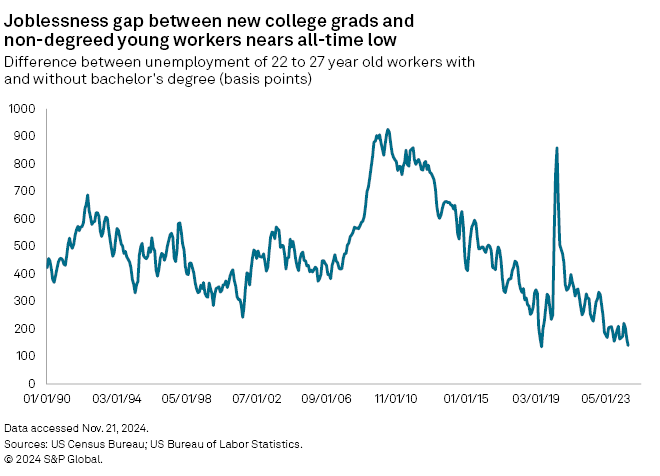
The fading employment advantage for new college graduates highlights the fragility of the diverging, domestic jobs market, where hiring remains steady and robust at the lower end of the pay scale but is now showing clear signs of strain at the higher end. Nearing employment parity between these two groups of young workers also underlines the diminishing value of a college degree, which data shows employers view as less of a necessity for jobs they are looking to fill.
"With a rising share of the population earning college degrees — even as average preparedness declines — a college degree isn't the signal it used to be," said Julia Pollak, chief economist at ZipRecruiter. "Employers are prioritizing skills over credentials, and labor shortages in non-degree fields like trucking and trades are shifting opportunities away from traditional graduate roles."
The number of Americans with a bachelor's degree or higher grew to 85 million in 2021 from 47.2 million in 2001, an 80% increase, as the price tag for the average tuition at a private four-year college more than doubled over that time, according to the US Census Bureau and the Education Data Initiative.
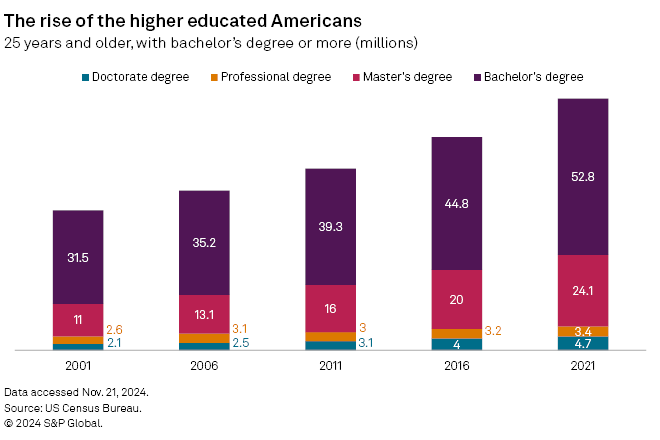
The overall US civilian labor force grew less than 13% over that two-decade period, according to the US Bureau of Labor Statistics.
Recently, sectors with less educational barriers to entry, like healthcare support, trades and logistics are still seeing strong labor demand and wage growth, while fields with relatively high educational requirement, such as technology and finance, are seeing labor supply tipping above demand, Pollak said.
"For grads, more degrees in the labor force means tougher competition for the set of jobs aligned with their qualifications — a set that is temporarily smaller than before the pandemic due to restrictive monetary policy and reduced labor market churn," Pollak said.
The rising unemployment rate for recent college graduates is a sign of the ongoing cooldown in the US job market, particularly among white-collar jobs, said Luke Pardue, policy director at the Aspen Institute's Economic Strategy Group.
This could be the result of excess hiring in professional services in the early days after the pandemic and an ongoing reckoning that firms now have to deal with larger-than-needed workforces, Pardue said.
"As a result, younger workers coming into the job market are met with fewer job openings," Pardue said.
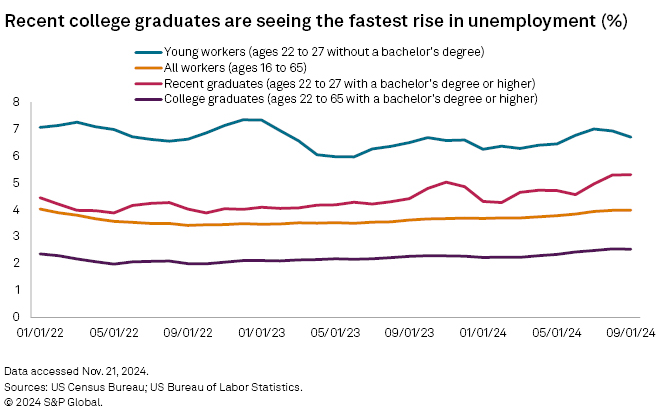
Diminished degree
For the broader labor market, a college degree remains a distinct advantage for workers seeing job stability. The unemployment rate for all workers 25 years and older with a college degree was 2.5% in October, compared with 3.8% for high school graduates who never went to college and 5.7% for workers without a high school diploma.
But a college diploma's perceived value has clearly diminished as university-educated workers lacking job experience are finding their job searches roughly as difficult as the ones facing their peers without diplomas.
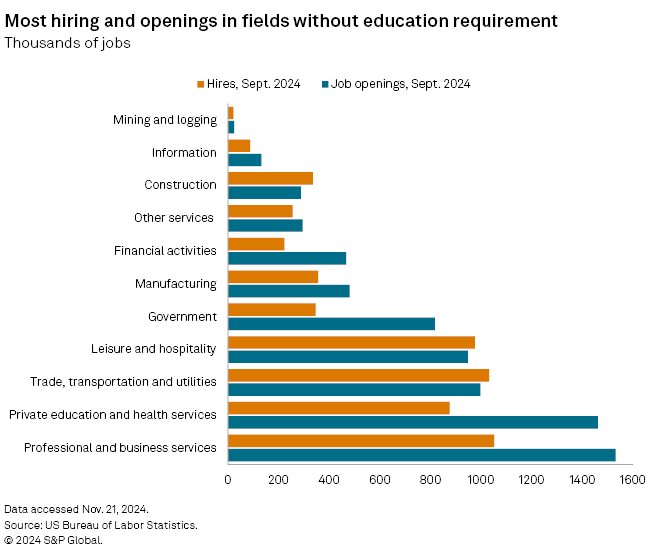
Job postings for knowledge work roles that typically require a college degree have plunged since 2022, while job postings for skilled labor positions, which often have no education conditions, have remained relatively steady, according to data from the Indeed Hiring Lab.
Indeed job postings in software development, for example, are down 32% from the pre-pandemic level, while postings for jobs in construction are up about 23%, said Cory Stahle, an economist with Indeed.
While the US labor market remains solid, heavy labor demand in large sectors is behind much of its strength, whereas workers in some diverging corners of the market are seeing increasing difficulty in finding new jobs quickly, Stahle said.
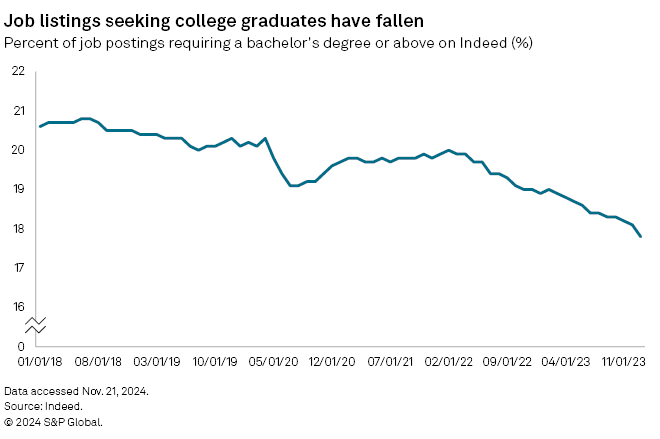
In addition, employers are looking less for workers with college degrees. Job postings at Indeed that include a requirement for a college degrees have fallen to 17.8% this year from 20.4% over the past five years.
"While that change seems small, it represents hundreds of thousands of jobs that have dropped formal schooling as a barrier to employment," Stahle said. "As a result, recent graduates are now more likely to compete with job seekers who lack a college degree but may have the skills needed for the role."
The recent decline in demand for college-educated workers may reflect struggles that small businesses are having in hiring and retaining workers but also the academic choices of younger workers, said James Knightley, chief international economist with ING.
Knightley said that a CEO of a manufacturing company recently told him that when he advertises a job opening for a position on the finance team that might pay $50,000 per year, he typically gets 90 applicants. But if he advertises for a production supervisor position that pays double, he might only get one applicant.
"I guess we have all been groomed into thinking that a college degree is the route to a great career and financial security, whereas the situation today is that the competition from graduates is keeping a lid on wages and those without a degree are often finding better paid positions," Knightley said.



